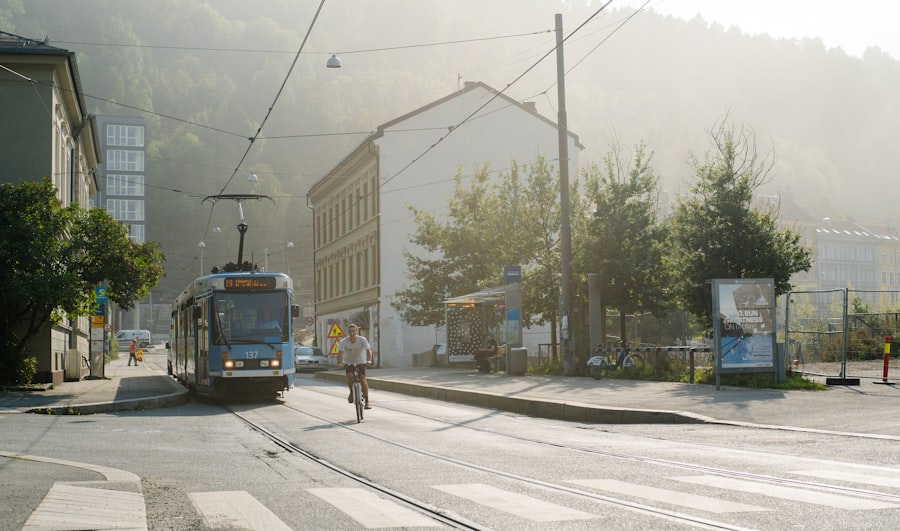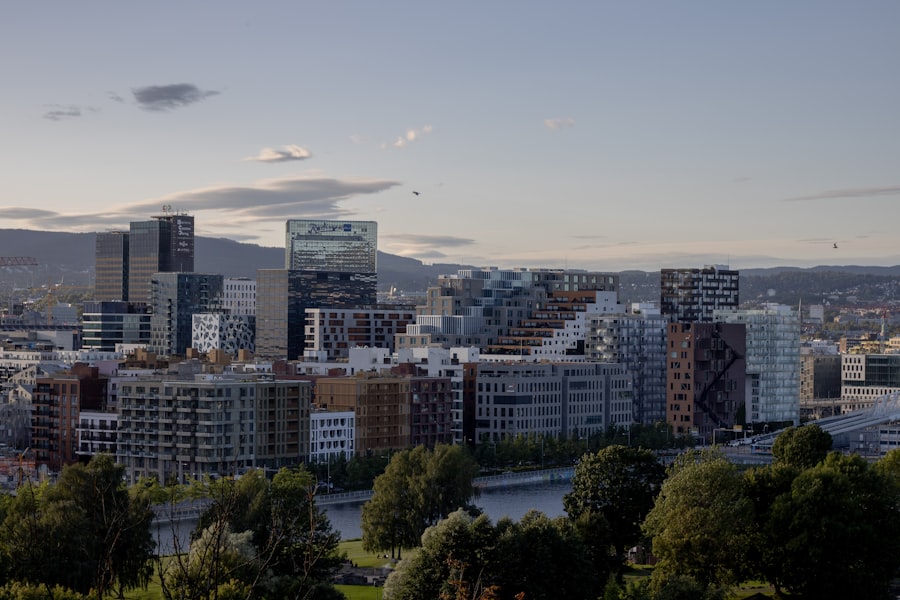The Norwegian rental market is characterised by its unique dynamics, shaped by the country’s economic conditions, cultural norms, and geographical diversity. In recent years, there has been a noticeable increase in demand for rental properties, particularly in urban areas such as Oslo, Bergen, and Stavanger. This surge can be attributed to a growing population, an influx of expatriates, and a robust job market.
As a result, prospective tenants may find themselves navigating a competitive landscape where desirable properties are quickly snapped up. Understanding these market trends is crucial for anyone looking to rent in Norway. Moreover, the rental market in Norway is heavily influenced by seasonal fluctuations.
For instance, the summer months often see a spike in demand as students and seasonal workers seek accommodation. Conversely, during the winter months, the market may experience a lull. This cyclical nature of the rental market means that timing can be just as important as location when searching for a property.
Familiarising oneself with these patterns can provide valuable insights into when to begin the search and how to approach negotiations with landlords. Take the first step. Book a consultation with the Norway Relocation Group for your move to Norway.
Summary
- The Norwegian rental market can be competitive, so it’s important to start your search early and be prepared to act quickly when you find a suitable property.
- When looking for the right location in Norway, consider factors such as proximity to public transport, amenities, and your workplace or school.
- Budgeting for rent and additional expenses in Norway should include costs for utilities, internet, and possibly parking or storage fees.
- Understanding rental contracts and regulations in Norway is crucial to ensure you are aware of your rights and responsibilities as a tenant.
- When searching for rental properties in Norway, consider using online platforms, local newspapers, and networking with locals to find the best options.
Finding the Right Location in Norway
Choosing the right location is paramount when renting a property in Norway. Each city and region offers distinct advantages and disadvantages that cater to different lifestyles and preferences. For instance, Oslo, the capital city, is known for its vibrant cultural scene, excellent public transport, and diverse job opportunities.
However, it also comes with a higher cost of living compared to smaller towns. On the other hand, cities like Tromsø or Ålesund may offer a more relaxed pace of life and stunning natural beauty but might lack some of the amenities found in larger urban centres. When considering location, it is essential to think about proximity to work or educational institutions, access to public transport, and local amenities such as shops, parks, and healthcare facilities.
Additionally, the lifestyle one wishes to lead should influence this decision. For those who enjoy outdoor activities, living near the fjords or mountains may be appealing, while those who thrive in bustling environments may prefer urban settings. Ultimately, taking the time to research various locations will ensure that you find a place that aligns with your personal and professional needs.
Budgeting for Rent and Additional Expenses

Budgeting for rent in Norway requires careful consideration of not only the monthly rental price but also additional expenses that may arise. The cost of living in Norway can be relatively high compared to other countries, so it is vital to have a clear understanding of your financial situation before committing to a rental agreement. Rent prices can vary significantly depending on the location and type of property; therefore, it is advisable to set a realistic budget that encompasses all potential costs.
In addition to rent, prospective tenants should account for utilities such as electricity, water, heating, and internet services. These costs can add up quickly and should be factored into your overall budget. Furthermore, it is essential to consider other expenses such as council tax and any maintenance fees associated with the property.
By creating a comprehensive budget that includes all these elements, you can avoid any unpleasant surprises and ensure that your new home remains financially manageable.
Understanding Rental Contracts and Regulations in Norway
Navigating rental contracts in Norway can be daunting for newcomers unfamiliar with local laws and regulations. Rental agreements typically outline the terms of tenancy, including the duration of the lease, rent amount, payment methods, and responsibilities of both tenants and landlords. It is crucial to read through these contracts carefully before signing to ensure that you fully understand your rights and obligations.
Norwegian law provides strong protections for tenants, including regulations regarding rent increases and eviction processes. For instance, landlords are required to provide written notice before increasing rent or terminating a lease. Familiarising yourself with these regulations can empower you as a tenant and help you avoid potential disputes with your landlord.
If any aspects of the contract are unclear or seem unfair, do not hesitate to seek clarification or legal advice before proceeding.
Searching for Rental Properties in Norway
The search for rental properties in Norway can be conducted through various channels, each offering its own advantages. Online platforms such as Finn.no and Hybel.no are popular choices for many prospective tenants, providing extensive listings across different regions. These websites allow users to filter searches based on criteria such as price range, location, and property type, making it easier to find suitable options.
In addition to online searches, networking can also play a significant role in finding rental properties. Engaging with local communities through social media groups or expat forums can yield valuable leads on available rentals that may not be advertised publicly. Furthermore, enlisting the help of local real estate agents can streamline the process; they possess insider knowledge of the market and can assist in negotiating terms with landlords.
Combining these approaches will enhance your chances of finding the perfect rental property.
Viewing and Inspecting Rental Properties

Once you have identified potential rental properties, arranging viewings is an essential next step. Viewing a property allows you to assess its condition firsthand and determine whether it meets your expectations. During these visits, it is advisable to take notes and photographs to help you remember each property’s features and drawbacks.
When inspecting a rental property, pay close attention to details such as cleanliness, maintenance issues, and overall functionality of appliances and fixtures. It is also wise to inquire about any recent renovations or repairs that have been made. Additionally, consider the surrounding area; take note of noise levels, nearby amenities, and general safety.
A thorough inspection will provide you with valuable insights that can inform your decision-making process.
Negotiating Rent and Terms with Landlords
Negotiating rent and terms with landlords can be an intimidating prospect for many tenants; however, it is an essential part of securing a favourable rental agreement. Before entering negotiations, it is crucial to conduct thorough research on comparable properties in the area to understand what constitutes a fair price. This knowledge will empower you during discussions and enable you to make informed arguments if you believe the rent is too high.
When negotiating terms, approach the conversation with professionalism and respect. Clearly articulate your reasons for requesting adjustments while remaining open to compromise. For instance, if you are seeking a lower rent due to minor maintenance issues observed during your viewing, present this information tactfully.
Building rapport with your landlord can also facilitate smoother negotiations; demonstrating reliability and respect for their property may encourage them to consider your requests more favourably.
Securing a Rental Property in Norway
Once you have successfully negotiated terms with a landlord, securing the rental property involves completing several key steps. Typically, landlords will require prospective tenants to submit an application form along with supporting documents such as proof of income or employment references. Providing these documents promptly can demonstrate your seriousness as a tenant and expedite the approval process.
After receiving confirmation from the landlord that your application has been accepted, it is essential to review the rental contract thoroughly before signing. Ensure that all agreed-upon terms are accurately reflected in the document. Once signed, you may be required to pay a deposit—usually equivalent to one or two months’ rent—before moving in.
This deposit serves as security for the landlord against potential damages or unpaid rent during your tenancy.
Setting Up Utilities and Services in Your Rental Home
After securing your rental property in Norway, setting up utilities and services is an important next step that should not be overlooked. Essential services such as electricity, water supply, heating, and internet access are crucial for comfortable living. In many cases, landlords will provide information on how to set up these services; however, it is advisable to take initiative and contact utility providers directly.
When setting up utilities, be prepared to provide personal identification information along with your rental agreement details. It is also wise to compare different service providers to find competitive rates for internet and television services; many companies offer bundled packages that can save you money in the long run. Ensuring that all utilities are operational before moving in will contribute significantly to a smooth transition into your new home.
Understanding Tenant Rights and Responsibilities in Norway
As a tenant in Norway, it is vital to understand your rights and responsibilities under Norwegian law. Tenants are entitled to certain protections regarding their living conditions; for example, landlords are legally obligated to maintain properties in good repair and ensure they meet safety standards. If issues arise during your tenancy—such as maintenance problems or disputes over rent increases—knowing your rights will empower you to address these matters effectively.
Conversely, tenants also have responsibilities that must be upheld throughout their tenancy. This includes paying rent on time, keeping the property clean and well-maintained, and respecting neighbours’ rights to quiet enjoyment of their homes. Familiarising yourself with both rights and responsibilities will foster a positive relationship with your landlord while ensuring compliance with local regulations.
Tips for a Smooth Transition into Your Rental Home in Norway
Transitioning into a new rental home can be both exciting and challenging; however, there are several strategies that can facilitate a smooth move-in process. First and foremost, create a checklist of tasks that need to be completed before moving day—this may include setting up utilities, changing your address with relevant institutions, or purchasing necessary household items. Additionally, take time to familiarise yourself with your new neighbourhood once you move in.
Explore local shops, parks, public transport options, and community resources; this will help you feel more at home in your new environment. Engaging with neighbours can also foster connections within the community; consider introducing yourself or participating in local events. Finally, if you are looking to enhance your experience living in Norway further—especially if you are new to the language—consider enrolling in Norwegian courses at the NLS Norwegian Language School in Oslo.
These courses cater to various proficiency levels and provide an excellent opportunity not only to learn the language but also to immerse yourself in Norwegian culture. By investing time in language learning at NLS Norwegian Language School, you will not only improve your communication skills but also enrich your overall experience living in this beautiful country. In conclusion, navigating the Norwegian rental market requires careful planning and consideration at every stage—from understanding market dynamics to securing a property and settling into your new home.
By following these guidelines and embracing opportunities for personal growth through language learning at NLS Norwegian Language School in Oslo, you will be well-equipped for a successful transition into life as a tenant in Norway.
Learn more about the Norwegian classes at the NLS Norwegian Language School in Oslo

